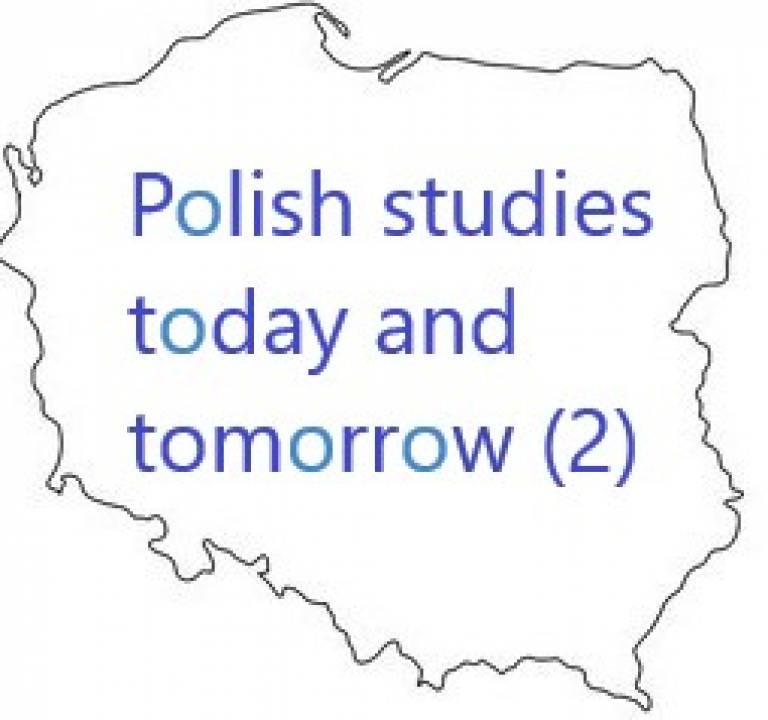Polish Studies Today and Tomorrow 2nd Annual Conference
22 September 2020–23 September 2020, 9:30 am–2:30 pm

Presented by the UCL SSEES Polish Studies Research Group and British Association for Slavonic and East European Studies Polish Studies Group
This event is free.
Event Information
Open to
- All
Availability
- Yes
Cost
- Free
Organiser
-
Anne White
Location
-
Online
Like previous Polish studies events at SSEES, including the 2019 ‘Polish Studies Today and Tomorrow’ conference, this event has a workshop format. Speakers will present work in progress. They look forward to receiving friendly and detailed feedback from colleagues united by a common interest in Poland, including Polish migration, but representing different academic disciplines. BASEES, and the BASEES Polish Studies Group, have an international membership, and this is reflected in our events (although you do not have to be a member of BASEES to participate). The BASEES Polish Studies Group ‘aims to enhance discussion on critical perspectives emerging in the field of Polish studies...The group seeks to foster research collaboration and enhance exchanges of ideas and expertise.’
This year’s conference will be held on on-line. To facilitate informed discussion, short papers will be made available in advance of the conference. Each speaker will present their paper in 15 minutes, followed by 25 minutes of questions and answers. Since this is work in progress, attendees are asked not to quote the papers without the authors’ permission. Registration will be announced shortly.
If you would like to attend, please email Anne White, Grabowski Professor of Polish Studies, SSEES, at anne.white@ucl.ac.uk by 15 September 2020.
22 September 2020
Panel 1: Protecting human rights (9.30-10.50)
Agnieszka Kubal, ‘Who are the humans behind Human Rights in Poland?’
Iwona Zielińska and Michael Rasell, ‘Supporting Polish victims of domestic abuse in the UK: practitioner perspectives’
Panel 2: Young Poles abroad: Sweden and the UK (11.10-12.30)
Oksana Shmulyar Gréen, Charlotte Melander and Ingrid Höjer, ‘The role of the Catholic community in Sweden for young Polish migrants’ transition[s] to adulthood’
Olga Czeranowska, Izabela Grabowska, Agnieszka Trąbka & Iga Wermińska-Wiśnicka, ‘Career paths of young Poles in the UK’
Panel 3: Transnational family ties across the centuries (1.10-2.30)
Oliver Zajac, ‘Family happiness over the national cause: Appeals of Polish émigrés for allowing their return from the Great Emigration’
Marta Kempny, ‘Coronavirus: (Im)mobilites, transnational practices and the impact on Polish migrants in Northern Ireland’
23 September 2020
Panel 4: Ethnic and racial hierarchies in Poland and the UK (9.30-10.50)
Gabriella Elgenius and Steve Garner, ‘Gatekeeping the nation: national identity claims and logics of entitlement, majority vs minority’
Anne White, ‘Migrant hierarchies in Poland: the case of Płock’
Panel 5: Conflicting memories of Inter-War Poland and the Holocaust (11.10-12.30)
Paweł Duber, ‘“Two coffins”: Nationalism, authoritarianism and politics of memory in contemporary Poland’
Issy Sawkins, ‘Polish responses to Russian Holocaust memory of Auschwitz-Birkenau and Sobibór’
Panel 6: Polish theatre and literature (1.10-2.30)
Kasia Lech, ‘Verse in Contemporary Polish Theatre: Between Traditions and Experimentations’
Katarzyna Zechenter, ‘From “Poland’s Genius” to the World as “a living, single entity:” World, Literature and Writer’s Duty in Lectures of Polish Laureates of the Nobel Prize in Literature (1905-2019)’
Book of Abstracts can be found here:
 Close
Close

